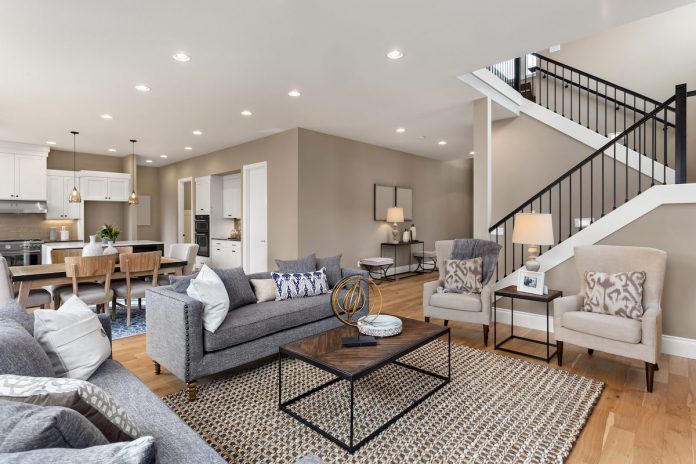The Pros And Cons Of Open Floor Plans
Designing a home is one of the most exciting and stressful parts of house planning. While this is the area where you can allow your dreams to come true, you might find it difficult about which plan you’ll be planning to go for.
As you design for your home, you might come across the idea of having an open floor plan as it’s what most homeowners would love to have in their homes. With that, you might be interested in what it is, how does it benefit your home, and some drawbacks to take into consideration.
What Is An Open Floor Plan
An open floor plan is joining two or more spaces in the household, such as the living room, kitchen, and dining area in a single space while eliminating the wall’s presence. In this way, you can have a large layout that allows you to place anything you’d like without the limitations of walls for each space. You can create an open floor plan about which area goes to which, allowing for efficient flow inside your home.
Pros Of Open Floor Plans
An open floor plan is popular for most owners, and there are plenty of great reasons behind it. Furthermore, listed below are the reasons why you should consider having an open floor plan:
- Maximizes The Space
If your household has a small space, you may want to give an illusion that it’s larger than what it looks like. To allow that from happening, having an open layout would be the best option for your home.
With fewer walls, you can allow the room to be more expansive without actually adding square footage to your home. The presence of walls can make the room squeezed together and diminish space for walking and moving around. Hence, preparing a detailed plan is advantageous and cost-effective especially for apartments or homes that have little budget for expansion.
- Improves Traffic Flow
If your floor plan includes plenty of walls, you need to make room for door openings to allow for a flawless traffic flow. With that, you may need to compromise on the room size for hallways, making each room smaller and crowded.
With an open floor plan, you no longer have to worry about door spaces wherein you take down all walls and windows to maximize the space you have on the floor. Along with this, people can freely move around every room without worrying about any sudden door openings that they could bump into.
- Better Communication
With walls as a divider, it’ll be difficult to communicate with everyone inside your home. Unless you’re okay with the constant screaming, it’ll be a lot better to have an open floor plan for ease of communication.
As you cook for your meals, it would be great if you could still involve yourself with family conversations, even if they’re lounging on the sofa or having a cup of coffee in the dining room. In this way, you don’t separate yourself from the conversation but rather include everyone on the floor. Moreover, entertaining guests would be highly convenient, especially when they arrive extra early in your home and you’re still preparing their snacks in your kitchen.
- Arrangement Flexibility
As you decide to go for an open floor plan, you no longer have to commit yourself to a specific floor layout as you can play around about which area you’d like to have in your home. If you prefer to have a kitchen near the living room rather than the dining area, you can freely do so. All you have to do is place your furniture and appliance perfectly. Thus, you should allow your floor plan to be exactly how you want it to be.
With an open floor plan, you have the freedom to arrange the area in your home anywhere you’d like. You can also set the orientation of your furniture and decide where you’d like to face them. In this way, you can fully maximize your space and allow your home to be unique just for you.

Cons of Open Floor Plan
While there are plenty of benefits of having an open floor space, there might be some drawbacks that you need to be aware of. Before you proceed with having a floor plan, you should know the cons to see if it’s the right decision for your home.
- Expensive Energy Cost
Since you’re allowing your entire floor to be a single room, expect that you’ll be needing more power to cool and warm up the whole place. Apart from the coverage area, you also need to turn on your HVAC units on the entire floor rather than on the individual rooms.
With an open floor plan, you don’t have the liberty just to turn the heater on your living room, even if it’s where the entire family is hanging out as you need to heat the whole floor. With that, you might anticipate a slight blow with your energy costs.
- Need For Constant Cleaning
An open floor plan enables you to see everything from one corner. With that, every clutter in the area would always be noticeable, and it’ll be difficult to hide, especially in your kitchen.
For an open floor plan, you may need to clean your entire home more often to keep it tidy. With fewer dividers, clutters might be more present inside your home. Ideally, you should practice constantly cleaning up after yourself. However, you need to encourage your family to do the same to achieve a neat household.
- Lack Of Privacy
Utilizing an open layout for your household, in some way diminishes your privacy. You’re actually sharing your space with everyone in your home. If you plan on working in your office while your kids are getting rowdy in the living room, expect that it’ll be noisy, and your children might even try to interrupt you during work hours. With this, it might be difficult to have privacy, which allows you to do your thing at peace.
Moreover, as you lack privacy, expect the entire floor to be noisy as there’ll be nothing to block out any noise. With that, you’re sharing the noise with everyone, from your living room to your kitchen. Hence, you should consider this before proceeding with an open floor plan.
Conclusion
Having an open floor plan has its positive and negative sides. While the pros are outstanding as you allow yourself to be with everyone all the time, it might bring along some drawbacks you’re not fully comfortable with. So, before proceeding with an open floor plan, it’s important to know the pros and cons and see if it’s something you’re comfortable working around.


